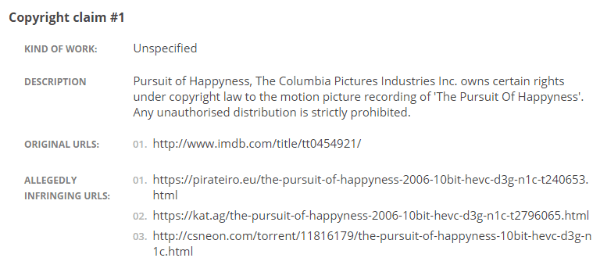‘Collaboration is Key to Disrupting Video Streaming Piracy’
lundi 3 septembre 2018 à 22:05 Over the past decade, online video streaming has become the preferred media consumption tool for many, and more and more people are getting on board.
Over the past decade, online video streaming has become the preferred media consumption tool for many, and more and more people are getting on board.
While legal streaming tools such as Netflix and YouTube have a massive reach, unauthorized streaming sites and services have grown alongside.
To curb this trend several new anti-piracy initiatives have popped up. These include the Coalition Against Piracy (CAP). The group launched last year as CASBAA’s anti-piracy arm and is now backed by its successor, the Asia Video Industry Association (AVIA).
To get an overview of the latest developments TorrentFreak reached out to AVIA’s Neil Gane, who works as the Coalition Against Piracy‘s General Manager. While he prefers not to mention any specific piracy targets, Gane emphasizes that pirate streaming boxes remain a top enforcement priority.
“I can say that CAP’s immediate focus is on infringing applications and its associated ecosystem, including the preloaded illicit streaming devices (ISD) used to access infringing content,” Gane informs TF.
These illicit streaming devices are boxes pre-configured to stream pirated content. This allows users to watch free movies and TV-shows, or live broadcasts including sports games, which millions do.
The streaming box problem isn’t an easy one to solve. However, Gane hopes that a lot of progress can be made when various industry players and organizations work together.
“There is no one silver bullet to streaming piracy and the infringing APK ecosystem. And there will always be a small number of consumers who prefer to free-ride,” Gane says.
“What is required is a holistic solution with all stakeholders including content producers, distributors and industry associations working together to address this serious and growing problem.”
AVIA already works closely together with similar-minded groups. This includes the Alliance for Creativity and Entertainment, which is very active in the US, with which it shares intelligence and resources. This results in more efficient and effective investigations, Gane notes.
While the entertainment industry has a similar goal, AVIA would also like various governments to work together. By providing the rights enforcement tool and updating copyright law, where needed. Thus far, progress on this front has been slow.
“The impact that intellectual property crimes can have on a country’s economy is now widely accepted. But this recognition does not always result in legislative change and meaningful solutions,” Gane tells TF.
“Unfortunately, some policymakers in Asia have chosen to delay any action on ISDs and the APK infringing ecosystem, whilst the problem grows and enters the consumer mainstream.”
But even when the entertainment industries and governments are aligned, more collaboration is required. In particular from Internet services such as online shopping platforms and payment providers.
There is some progress on this front. For example, PayPal and Mastercard are helping to address the piracy problem in Asia, and so are local e-commerce platforms such as Lazada.
“Working alongside e-market platforms and social media sites where ISDs are commonly traded, as well as disrupting illicit commercial transactions at the point of sale are key components of any anti-piracy strategy,” Gane notes.
“Over the last 8 months CAP has been working closely with popular e-markets in SE Asia as well as local and international payment processors including PayPal and Mastercard.”
Overall, the key term is collaboration. According to Gane, things are going well between local and international industry associations.
AVIA and the Coalition Against Piracy itself are a good example of collaboration too. The latter protects the interests of many major players in the region, including Disney, Fox, HBO Asia, NBCUniversal, Premier League, Turner Asia-Pacific, BBC Worldwide, National Basketball Association, TV5MONDE, Viacom International, and others.
More progress can be made against streaming piracy if governments and Internet services work along as well. That, however, is more easily said than done.
Source: TF, for the latest info on copyright, file-sharing, torrent sites and more. We also have VPN reviews, discounts, offers and coupons.
 To protect copyright holders, YouTube uses an advanced piracy recognition system that flags and disables videos which are used without permission.
To protect copyright holders, YouTube uses an advanced piracy recognition system that flags and disables videos which are used without permission.  Running alongside the incredibly popular torrent site The Pirate Bay, Dreamfilm was a Swedish portal that offered content in the increasingly popular streaming format.
Running alongside the incredibly popular torrent site The Pirate Bay, Dreamfilm was a Swedish portal that offered content in the increasingly popular streaming format. This week we have two newcomers in our chart.
This week we have two newcomers in our chart. Every single day, largely automated bots scour the web for references to pirated content.
Every single day, largely automated bots scour the web for references to pirated content. 
